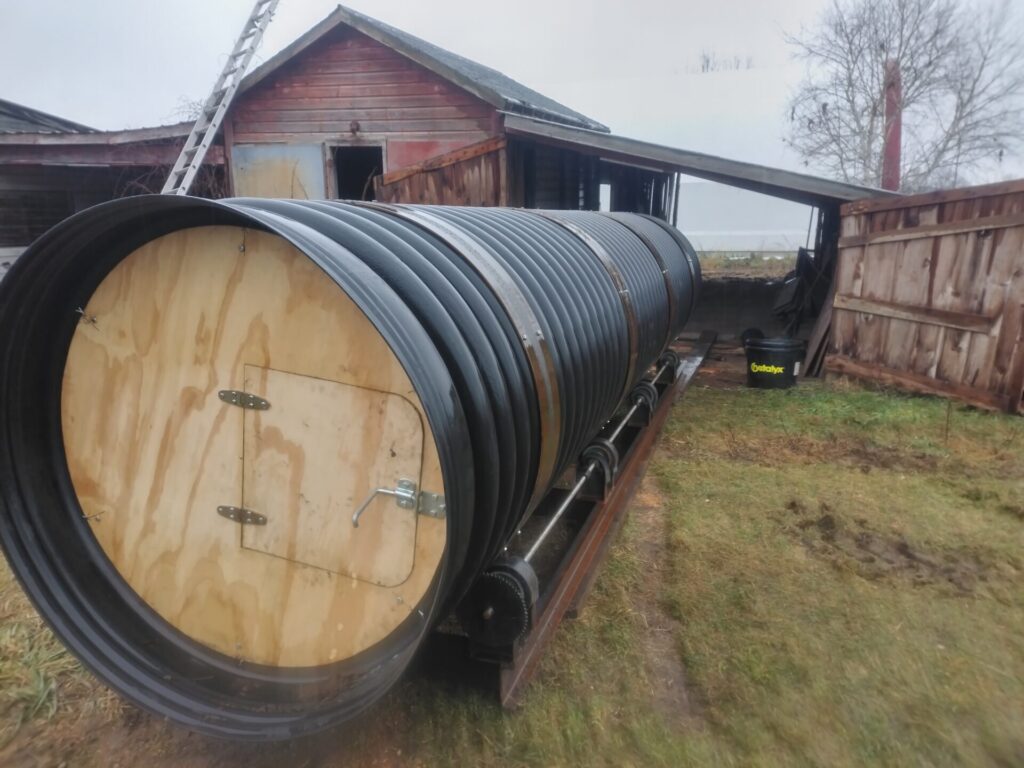Each year, Americans discard 120 billion pounds of food scraps. That’s 325 pounds per person, or about 40% of the total waste stream. Packed into landfills, these food scraps generate greenhouse gasses as they slowly decompose. The same food scraps, when processed through a composting facility, regenerate as materials that improve soil health, reduce erosion, reduce the amount of pesticides and chemical fertilizers required and improve water quality. This is the power of composting.
In the North Country, over $200,0000 of funding from two USDA Rural Business Development Grants (RBDG) is fueling AdkAction’s Compost for Good (CfG) project to support a robust and growing network of community scale composting businesses, including scale compost site operators and food scraps transporters across St Lawrence, Clinton, Essex and Franklin Counties.
With this funding, CfG and its fiscal partner AdkAction supported the construction of two 20’x4’ rotating drum composters that were awarded to two North Country sites through a competitive application process. The first composter was won by the Towns of Newcomb and Minerva who will begin collecting food scraps from the community in partnership starting this Spring. The second composter was won by Ben Wever Farm in Willsboro.
“The grant of a drum composter is a game-changer for our farm’s waste management practices, aligning seamlessly with our commitment to sustainability,” said Pierre-Luc Gelineau, manager of Ben Wever Farm. “This opportunity enables us to enhance soil health and elevate the quality of our compost. The modular design provides potential for the joint development of additional features with Compost for Good as well. Thanks to AdkAction for this transformative grant, and we eagerly anticipate the positive impact on our farm’s sustainability journey.”
To increase local manufacturing of composting equipment, St Lawrence County based Mud Lake Stalls was selected competitively to build the system which is based upon an open source design created by CfG Co-Founder John Culpepper. To date, there are 8 community-scale rotating drum composters operating in the region.
The North Country is home to many businesses dedicated to helping our communities compost their waste. Food scrap transportation and compost sales create jobs for local farms and businesses, while keeping dollars in local communities.
USDA RBDG funding has allowed CfG and AdkAction to strengthen regional compost-related businesses through technical assistance and the creation of tools to improve their operations, including North Country Compost, Blue Line Compost, River Valley Regeneratives, Reber Rock Farm, the Cook Family Farm, Sugarhouse Creamery, North Country Creamery, Placid Earth, Ben Wever Farm and the Whitten Family Farm, among many others.
CfG is also educating new audiences about the value of diverting food scraps from landfills, and worked with Adirondack-based Adsit Mediaworks to create three educational videos on the social, environmental, and economic impacts of community composting to bring awareness to these benefits. Otter and Owl Media created a case study highlighting a novel neighborhood-scale composting system designed and piloted by CfG’s John Culpepper. All materials are open source and available to the public.
Westport’s Camp Dudley added the new neighborhood-scale composting system in 2023. “This system has made it possible for our camp to divert 22,000 lbs of food scraps from the landfill, while making compost that can be used on our grounds,” said Matt Storey, Camp Director. “The vertical system makes it manageable for our staff.”
In addition to providing support for food scrap hauling and composting businesses, and creating more food scrap reduction tools, CfG will be launching public outreach campaigns in several communities this year. Four compost liaisons will coordinate food scrap reduction campaigns in Malone, Canton, Lake Placid and Potsdam starting in April.
“Several years ago we set out to spark a composting revolution in Upstate New York,” said John Culpepper, Co-Founder of Compost for Good. “We have done that and more. However, there is so much more work that needs to be done! In the upcoming year, we encourage you to be part of the efforts to ‘reimagine waste.’”
To find out more about these campaigns, for details on the neighborhood-scale and/or rotating drum composter design, or to see how CfG can assist with your food waste management and composting goals, contact Organics Recycling Coordinator Jennifer Perry – [email protected]; 518.588.2965.





